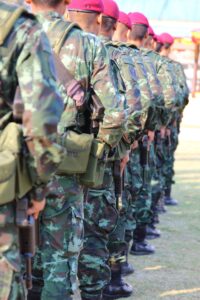Army Regulation 15 of the Uniform Code of Military Justice (UCMJ) is the judicial process where the commander of the serviceman or woman may bring charges against a soldier.
According to the U.S. Army Field Guide soldiers are subject to punitive action for violations of the Military Code of Justice, which falls under the UCMJ.
These violations are assigned numerical values, with Army Regulation 15 being the most minor of disciplinary offenses.
A soldier is said to be under “Article 15” when their commanding officer issues them a reprimand for misconduct. This may or may not involve any actual punishment according to army regulations.
Here are the top 10 crucial responsibilities when a soldier is facing an Article 15 proceeding!
Table of Contents
1. Receiving an Army Regulation 15

Receiving Article 15 is a significant emotional event in a soldier’s life. Leaders sometimes forget how challenging these times can be for soldiers and their families.
While correcting substandard performance is essential, it is equally important to plan for the future.
We must ensure soldiers understand they can overcome this event and become productive team members.
Conducting a practical counseling session before and after the Article 15 procedure will assist the soldier to realize what has happened, why it happened, and how they can move forward positively.
The soldier is accountable for implementing a positive change. Soldiers often wonder how to file an Army Regulation 15 appeal in army regulation.
The Article 15 process starts with a “first reading.” This is when the imposing commander or his enlisted advisor informs the soldier they are being considered for nonjudicial punishment.
2. Counseling Before Article 15
It permits commanders to address allegations of minor misconduct against soldiers without resorting to higher forms of discipline, such as a court-martial.
The decision to impose Article 15 is ultimately the commander’s decision. Ensure the soldier understands the importance of being honest and accepting responsibility for their actions.
Duly prepare the soldier by having them get statements or ensure witnesses are ready for the Army Regulation 15 process.
Ask the soldier to consider a punishment they believe would be appropriate according to army regulation (if found guilty). Soldiers can be very hard on themselves and inventive with meaningful sentences.
3. Counseling after the Article 15

Article 15 is a severe event in a soldier’s career, but they’ll pick themselves up much faster with proper support.
After Article 15, the soldier is typically down and not exactly feeling their chipper self. Consider the following :
While life is difficult now, specifically if they are losing a stripe, or being barred, it’s not the end of the world.
You may not know everything that is going on with a soldier. Problems at home, on the job, or financial troubles may exist.
Let them know you will not hold this incident against them if they improve their substandard performance.
Urge them to remember the incident because one day, they will be an officer making the difficult decision to discipline a soldier, and their decision will affect one or all of the following concerning the soldier:
- Life
- Family
- Finances
- Career
- Emotions
In all cases, monitor the soldiers closely (before, during, and after) the investigation.
4. Procedures for Conducting Investigations and Inquiries
Designates an appointing authority responsible for initiating the investigation or inquiry.
Clearly specify the scope and purpose of the investigation or inquiry under army regulation. This includes specifying the issues to be examined and the objectives to be achieved.
Appoints a qualified and impartial investigator or inquiry officer to conduct the proceedings. This person should have the necessary knowledge and expertise to handle the case.
Conducts interviews with witnesses, collects evidence, and reviews pertinent documents to establish the facts of the case.
Maintaining confidentiality to the extent possible is crucial for protecting sensitive information and individuals’ privacy.
Requires the investigator to prepare a comprehensive report detailing the findings, conclusions, and recommendations, which is submitted to the appointing authority under army regulation.
Accountability and transparency are maintained throughout the process, with appropriate action taken based on the army regulation investigation’s results.
Requires the appointing authority to review the investigation report, make determinations, and take appropriate action based on the findings and recommendations.
Army regulation provides guidance on the appeals process for individuals who disagree with the findings or actions resulting from the investigation.
Specifies the retention and disposal of records related to the investigation or inquiry.
5. Army Regulation 15 Offenses

Article 15(4) of the Constitution gives citizens the fundamental right to move the Supreme Court in case the fundamental rights of citizens are violated by the State.
In such a case, the Supreme Court has no option but to issue directives to the government. However, the government has the authority to not follow the orders issued by the Court, and the Supreme
Court cannot force the government to follow its directives by giving contempt of court notices. This power of the government is called ‘Parliamentary Privilege.’
6. Honorable Discharge with an Article 15
If you are receiving an Article 15, it means that you have committed a minor offense, but one that is still serious enough to warrant being brought to the attention of a commanding officer.
For example, some Army Regulation 15 offenses are being late to formation, disobeying a lawful order, or having a bad attitude.
If you receive Article 15, it is the commanding officer’s choice whether to give you an honorable or dishonorable discharge.
You will unlikely get an honorable discharge, but it is possible. Your best bet is to speak with your commanding officers or to speak with an experienced Article 15 attorney.
7. Seriousness of Article 15

Article 15 is a disciplinary action. If you fail to perform your job well or have disciplinary problems, your chain of command can issue you Army Regulation 15.
If you receive Article 15, you will be given a warning and conduct. If you fail to improve your performance, you could be subject to further punishment, including arrest.
There are several things that you can do wrong that will get you an Article 15. One of them is having a sexual relationship with a superior or insubordination.
Its punishment ranges from reduced class, extra duties, and restriction to the limits of camp and confinement.
8. Security Clearance
Army Regulation 15 is a military term for a reprimand. It can be a written reprimand, a non-punitive letter of instruction, a punitive letter of instruction, a censure, a reprimand, a warning, a fine, a suspension, a demotion, a discharge, or a confinement.
Each of these has a different purpose. For instance, a written reprimand is a form of punishment that informs the service member of a deficiency for which they must correct behavior.
In contrast, a discharge is a severe punishment resulting in a service member’s separation from the military. A discharge can also be a bad conduct discharge, a dishonorable discharge, or a dismissal.
An administrative discharge may qualify a former service member for various benefits, including a pension and a VA home loan. This type of discharge generally takes effect immediately. It is not considered a conviction for crimes committed during military service, but it can prevent the individual from obtaining a security clearance.
Crucial Responsibilities of Army Regulation 15…
It’s important to note that the specific responsibilities and procedures outlined in Army Regulation 15 may vary depending on the nature of the investigation or inquiry, and compliance with applicable regulations and laws is essential.
Military personnel involved in such processes must follow the guidance provided and receive training on its proper implementation.





